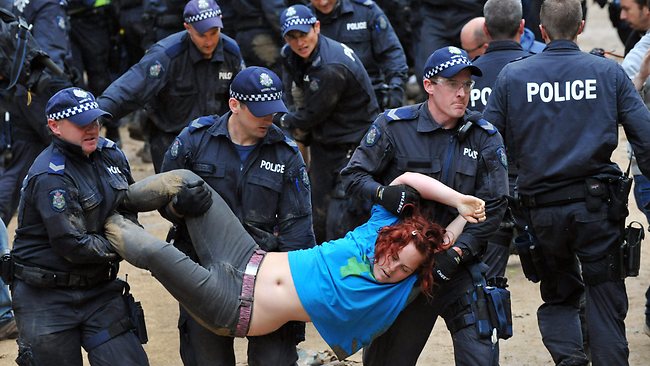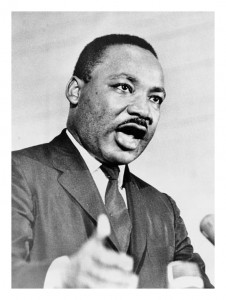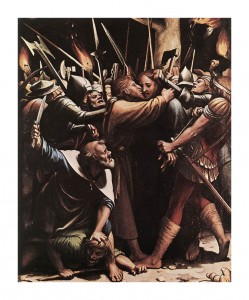Is Resisting Arrest Non-Violent?

I just wanted to write a short blog about a question I have been thinking about since reading and watching the unfolding of the “Occupy Melbourne” protests. The question is about whether a peaceful protest should engage in resisting arrest. I am very aware that this question is not the most important one to be asking. There are many blogs addressing the issues of the greed and corruption of corporations and their relationship with the government. There is disgust at the excessive use of force that some of the Victorian police used to remove the protestors from the City Square. I saw one YouTube video where a police officer reached across a crowd to punch a guy in the face! That sort of action is inexcusable and the recent call for the Ombudsman to investigate claims of police brutality seems justifiable. Having said that, I want to comment on an area of hypocrisy that I feel was present among a portion of the protestors and reflects a common misconception that I think is relevant.
If you watch the YouTube video above, you will see that one of the defining qualities of the “Occupy Melbourne” protests was that they were meant to be “peaceful”. Giving it this label, not only protects the protest from descending into a violent riot, but it also gives the protest an air of virtue and nobility. A “peaceful” protest? Who could argue with that? All they are doing is standing there and expressing their opinion. Why should anyone have a problem with that? In fact, anyone who would try to physically and forcibly remove them from their chosen place of protest is clearly just part of the violent, evil system of power that they are protesting against!
 Well, I think that’s hypocrisy. I think protests are an important and indispensable part of a healthy democracy, but I also think that if you are going to break the law when you protest then you have to be willing to take the consequences. There may be many occasions when breaking the law is an important and moral thing to do, and evil laws should be disobeyed and protested against. I think of the brave Rosa Parks who, in 1955, disobeyed the law that stated that a black person had to give up their seat to a white person on buses in Alabama, USA. This act of civil disobedience was the spark that ignited the civil rights movement and led to the rise of one of the greatest advocates of non-violent protest, Martin Luther King Jr.
Well, I think that’s hypocrisy. I think protests are an important and indispensable part of a healthy democracy, but I also think that if you are going to break the law when you protest then you have to be willing to take the consequences. There may be many occasions when breaking the law is an important and moral thing to do, and evil laws should be disobeyed and protested against. I think of the brave Rosa Parks who, in 1955, disobeyed the law that stated that a black person had to give up their seat to a white person on buses in Alabama, USA. This act of civil disobedience was the spark that ignited the civil rights movement and led to the rise of one of the greatest advocates of non-violent protest, Martin Luther King Jr.
On the website for the “Occupy Wall Street” protests (which the “Occupy Melbourne” protest is inspired by), there is a wonderful comment on their forum. One person writes that in order for the numbers of protestors to actually demonstrate power there is a need to agree on certain “organisational goals” which everyone should agree upon. This is what they wrote as their fourth goal:
4) Always remain non-violent and non-threatening – continue to apply the non-violent rules of engagement of Ghandi and Martin Luther King, Jr. Do not threaten law enforcement officials; do not even look at them menacingly. Do not taunt law enforcement officials. Engage them in dialog but do not get defensive or angry. Do not resist arrest. If police attack a member of the group, render aid to the member but do not attack the police in retaliation.
I believe the decision to protest non-violently requires you to also accept that your actions, if illegal, may result in you being requested to stop doing those actions – whether it be blocking something, staying in one place too long, making too much noise, or simply walking in solidarity with the oppressed. When requested to stop, you have to make the decision – will I obey or not? If you believe the moral thing for you to do is disobey, then you must accept that you will most likely be arrested for disobeying the civil authorities. If then, you do not accept that you will be arrested and you physically resist the consequences of your civil disobedience with more illegal activity (by “resisting arrest” which is illegal), it is then that you can no longer call yourself “non-violent”.
Physically resisting someone who legally is allowed to try to prevent you from doing something illegal, is a violent act. It is a form of passive aggression. Now, I guess some would argue that they were protesting the police’s right to enforce the law, and that may be a valid argument, but I don’t see how that secondary protest can be peaceful. If you hold the view that “people who act illegally should not be arrested if the cause is just” then I don’t see how you can engage in civil disobedience that is non-violent. In the end, you will always come up against the police whose job it is to defend and enforce the law. It is even more amazing then, when there is an outcry against the police who used excessive force and the call for the Ombudsman to see if the police acted illegally. What hypocrisy! If you are going to argue that the police must enforce the law in a way that is legal, then you have to also agree that the protestors must protest in a way that is legal. Now, I don’t in any way want to tarnish groups with one big brush. There were many protestors who left the occupation of the City Square at the time requested and there were those who refused and were removed or arrested without violent resistance. These protestors I believe are to be commended as consistent and deserve to hold the title “peaceful protestor”.
I keep thinking about Jesus and his form of peaceful protest. He disobeyed the expectations and false teaching of the religious rulers of his day and spoke out against them as he preached the gospel and pointed people to himself as the source of life and salvation. This got him arrested and on the night of his arrest he is ambushed by a group of thugs carrying swords and clubs.
and salvation. This got him arrested and on the night of his arrest he is ambushed by a group of thugs carrying swords and clubs.
Then Jesus said to the chief priests, the officers of the temple guard, and the elders, who had come for him, “Am I leading a rebellion, that you have come with swords and clubs? Every day I was with you in the temple courts, and you did not lay a hand on me. But this is your hour—when darkness reigns.â€Â Then seizing him, they led him away and took him into the house of the high priest. (Luke 22:52-54)
Peter, a close disciple of Jesus, responded with aggressive resistance when Jesus was arrested. He used his sword to defend himself and protect Jesus, but he was met with Jesus’ firm rebuke, “Put your sword back in its place. For all who draw the sword will die by the sword.” Later, Peter reflected on Jesus’ arrest and wrote these words in his first epistle,
It is commendable if a man bears up under the pain of unjust suffering because he is conscious of God. How is it to your credit if you receive a beating for doing wrong and endure it? But if you suffer for doing good and you endure it, this is commendable before God. To this you were called, because Christ suffered for you, leaving you an example, that you should follow in his steps. He committed no sin, and no deceit was found in his mouth. When they hurled their insults at him, he did not retaliate; when he suffered, he made no threats. Instead, he entrusted himself to him who judges justly. (1 Peter 2:19-23)
Jesus and the first Christians were powerful advocates for non-violent protest. In Acts, we see many acts of civil disobedience. Check out Acts 5:40-42 for example:
They called the apostles in and had them flogged. Then they ordered them not to speak in the name of Jesus, and let them go. The apostles left the Sanhedrin, rejoicing because they had been counted worthy of suffering disgrace for the Name. Day after day, in the temple courts and from house to house, they never stopped teaching and proclaiming the good news that Jesus is the Christ.

It is right to protest against something wrong. It is right to disobey a morally wrong law. I would even say that it is right at times to disobey a law that is not morally wrong (like a request to stop protesting) if it is in solidarity to a cause that stands against something that is morally wrong (I hope that made sense!). But in that last case, I think that you have to wear the consequences. To be willing to be fined or go to jail over an issue is a powerful message. I think of the men who were drafted during the Vietnam War and took a stand as a “conscientious objector”, refusing to be involved in a war they believed was wrong. Many went to jail rather than go to war. I think those men had great courage and honour and deserve to hold the title of “peaceful protestor”.
I’ll finish with advise: you can do what evert you want, but be ready to meet the effects and meet lawyers in Albany NY.
(4549)

